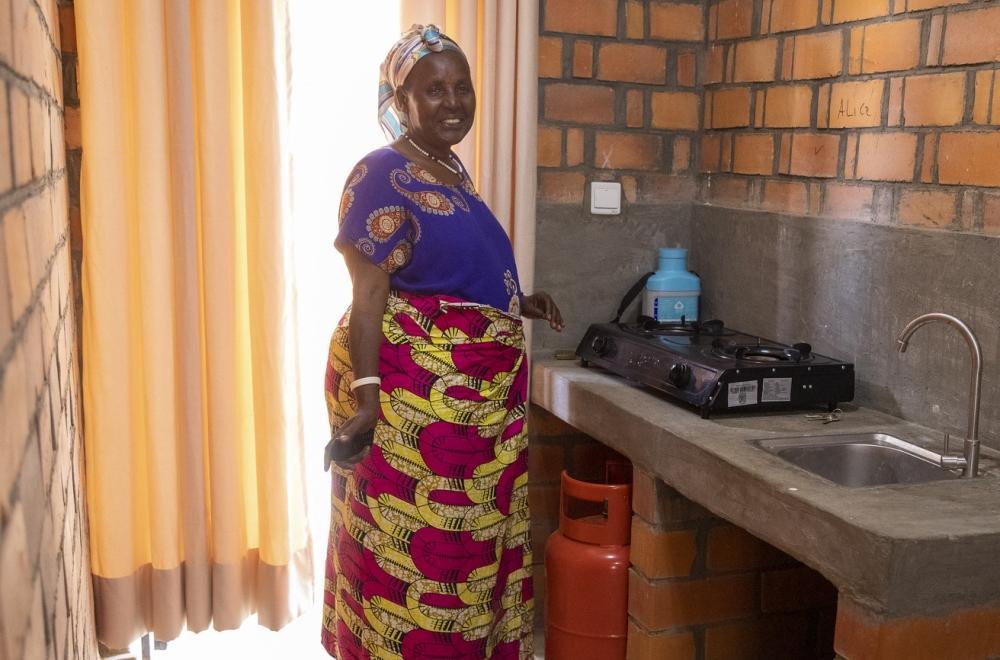Africa-Press – Rwanda. In a move set to transform access to clean cooking energy across Rwanda, private sector players are piloting a “pay as you cook” model that allows households to purchase gas in small, affordable amounts, similar to how charcoal is currently bought.
This was revealed on June 4 during a session between private sector representatives and the senate committee on economic development and finance. The idea, still in the feasibility study phase, aims to make liquefied petroleum gas (LPG) accessible to low-income earners who rely on charcoal and firewood.
“Just like people buy Rwf500 worth of charcoal, they will now be able to buy Rwf500, Rwf1,000 or Rwf1,500 worth of gas depending on their means,” explained Fabrice Ntakirutimana, the Managing Director of Tembo Africa Ltd.
“We are finalizing research on a system where a gas meter is installed between the gas cylinder and the stove, enabling usage based on the amount paid. For instance, a household could receive a 50kg gas cylinder and pay per use using mobile money. When your Rwf500 worth of gas runs out, you simply top up again.”
The cylinders will also come equipped with devices that monitor usage and ensure safety. However, implementing this at large scale, such as in 500 households requires significant investment, and Ntakirutimana urged the government to step in through its subsidy programmes.
Jean Claude Uwizeye, the vice chairman of the energy private developers association, supported the idea and pointed to Rwanda’s model villages as ideal sites for piloting this innovation.
“In a village with 140 houses, it’s inefficient for each household to own a separate gas cylinder. A centralized large cylinder could serve the entire village, with each household drawing gas based on their needs and financial ability,” he said.
Senator Laétitia Nyinawamwiza, the deputy chairperson of the senate committee on economic development and finance, endorsed the idea as a national-level project rather than a household initiative.
“It would be ideal if gas was distributed the way the water and sanitation corporation supplies us water through a centralized system. With abundant methane gas expected soon, households should access gas based on their means, just like turning on a tap,” she said.
Private entrepreneurs stressed that although they are exploring innovative clean cooking solutions, the upfront capital required is often beyond their means. Government backing, especially in the form of affordable loans, was seen as essential.
Philbert Dusenge, the project coordinator of the Energy Access and Quality Improvement Project (EAQIP) clean cooking results-based financing at the Development Bank of Rwanda (BRD), assured lawmakers of the government’s willingness to support such efforts.
“This technology could enable people to buy gas per kilogram; 1kg, 2kg, or 3kg. BRD is ready to offer loans to scale such solutions, which would help reduce reliance on charcoal and firewood. Our energy portfolio department works with SACCOs, microfinance institutions, and commercial banks to offer on-lending opportunities,” he added.
However, senators voiced concerns about BRD’s interest rates, arguing that loans for green energy projects should be more affordable.
Responding to this, Juliet Ingabire, who heads investment for development finance and risk management at RDB, said support is available through programmes like Ireme Invest and the Accelerating Sustainable and Clean Energy Transformation (ASCENT) project.
“We offer loans at a 12% interest rate. While some consider it high, it’s reasonable given that we borrow from development banks unlike commercial banks that use customer deposits,” Ingabire said.
Monica Keza, the country director of DelAgua Rwanda, a private company involved in carbon emissions reduction, stressed the need for mindset change alongside technological solutions.
“Cooking in Rwanda has deep cultural roots. In rural areas, the three-stone fire remains dominant. We must invest in education and behaviour change, especially in places where people don’t understand the value of improved cookstoves or their role in protecting the environment,” she said.
For More News And Analysis About Rwanda Follow Africa-Press






